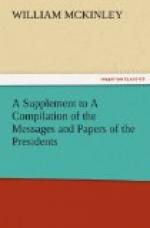The bill further confers upon the Court of Claims jurisdiction to try and determine certain alleged claims of said Tice and others for money collected on account of the Tice meters, but not paid over to him or them under the regulations of the Treasury.
The amount of the latter claim, according to the report of the committee of the House of Representatives to which this bill was referred, is $140,000. It does not appear from the report of the committee, nor from any documents to which I have access, who are the other persons by whom this latter sum is claimed. The claim for $140,000 must have accrued prior to July, 1871, and therefore at this time is of at least twenty-seven years’ standing.
It will thus be perceived that the object of the bill is to remove from the pathway of the claimants two legal bars to the prosecution of their claim in the courts—one, the bar of the statute of limitations, which requires all claimants against the Government to present their claims and bring actions thereon within six years from the time the cause of action accrues; and the other, that bar of estoppel which arises by reason of a former adverse judgment, rendered in a court of competent jurisdiction. This is not a general modification of the law in these respects, but a special application of it to these particular claimants.
If the principle on which the statute of limitations is founded is wise and beneficent, then the effect of it ought not to be impaired by special legislative exemptions in favor of particular persons or cases except upon very clear and just grounds, where no lack of diligence in the prosecution of the claim is apparent. I cannot find in the papers submitted to me any sufficient grounds to justify a special exception from the ordinary rule in favor of these claimants. As to the claim for $140,000, no reason is stated why it was not included in the original suit nor why action upon it was not brought against the Government within the six years allowed by the statute for that purpose. To permit such an action to be brought now is simply, without any reason of a special nature, to grant a privilege to these claimants which is denied to all other citizens of the United States, in accordance with the provisions of the general statute of limitations. The principle underlying statutes of limitations and the reasons for the maintenance of such a rule of litigation are much more cogent when applied to claims against the Government than when applied to claims against individuals.
These claims do not differ in their character from ordinary business transactions such as transpire every day between private persons or business corporations. The Government can only defend itself against claims of this nature through its public officers and with the use of such public records as the Departments may furnish. Great difficulties are experienced by it in contesting fraudulent and unjust claims, and it is only fair in the interest of the public that a rigorous adherence to some rule of limitation should be maintained.




